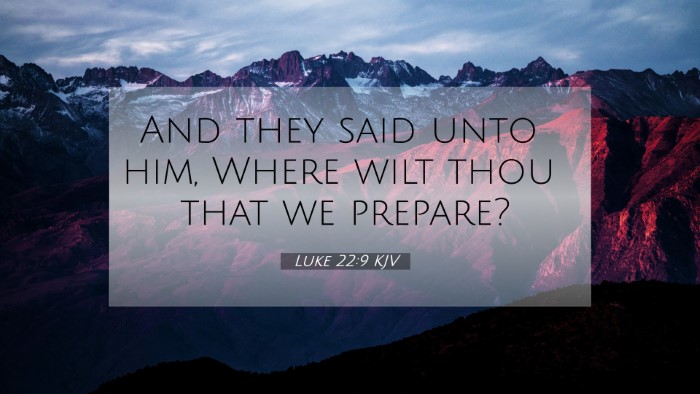Summary and Interpretation
The context of Luke 22:9 arises from Jesus’ instructions to His disciples about preparing the Passover meal. This moment highlights several themes in both the narrative and theological implications within scripture.
This verse serves as a pivotal point in the preparation for the Last Supper, marking the significance of the Communion event. The disciples inquire where the preparations should take place, reflecting their readiness to serve and obey Jesus’ commands.
- Discipleship and Service: The disciples represent the spirit of servitude in their willingness to prepare the Passover, which points towards the broader theme of service in the Christian faith.
- Prophetic Fulfillment: This incident aligns with the prophetic aspects of Christ’s ministry, fulfilling the Old Testament promises regarding the Passover and the coming of the Messiah.
- Theology of Preparedness: The verse underlines the necessity of being spiritually prepared for divine appointments, as frequently emphasized in biblical teachings.
Insights from Public Domain Commentaries
Matthew Henry: Henry highlights that the disciples’ question shows their eagerness to follow Jesus' instructions, suggesting a readiness to participate in the significant act of institutionalizing the Eucharist.
Albert Barnes: Barnes comments on the symbolic meaning of the preparation of the Passover in relation to Christ’s upcoming sacrifice, indicating a profound connection between the Old Testament sacrificial system and Christ's role as the ultimate sacrifice.
Adam Clarke: Clarke points out that the location of the preparation reflects the importance of obedience and the fulfillment of Christ's mission, where each detail in the preparation is critical for understanding the systematic approach to Christ’s redemptive work.
Bible Verse Cross-References
This verse is connected to several other scripture passages that enhance its understanding:
- Exodus 12:6: Details the preparation of the Passover lamb, indicating the historical significance of the feast.
- Matthew 26:17: Another account of the disciples asking Jesus where to prepare for the Passover.
- Mark 14:12: Similar to the passages in Matthew and Luke about the preparation of the Passover meal.
- 1 Corinthians 11:23-26: Discusses the Last Supper and the institution of Communion, reflecting the significance of the Passover meal Jesus shared with His disciples.
- Luke 22:7: Jesus instructs His disciples about the specifics of preparing for the Passover.
- John 13:1-2: Provides context about the significance of the Last Supper and Jesus's intentional preparation.
- Hebrews 10:1: Discusses the Old Covenant in relation to the New Covenant initiated through Christ’s sacrifice.
- Isaiah 53:5: Prophecies surrounding the suffering servant, connecting with the purpose of Jesus’s life and mission.
- Luke 22:14: Describes the moment when Jesus institutes the Last Supper, a direct consequence of the preparations made in response to the disciples' question.
- Romans 5:8: Relates to the overarching theme of Christ’s sacrificial offering, contributing to the preparation of the New Covenant.
Understanding the Connections Between Bible Verses
The connections between Luke 22:9 and the aforementioned verses reveal a pattern of divine purpose that permeates the biblical narrative. Cross-referencing this text with others helps illuminate key themes of obedience, sacrifice, and preparation that define the Christian faith.
Thematic Bible Verse Connections
Identifying the themes embedded in this verse enhances the reader's comprehension of the gravity of the Last Supper and its implications for New Testament believers. Notably, the Call to Discipleship, the importance of Obedience, and the realization of Redemption are interwoven throughout biblical texts.
Tools for Bible Cross-Referencing
Utilizing resources such as a Bible concordance or a cross-reference Bible study guide can greatly aid in uncovering the intricate connections between various verses. These tools empower readers to deepen their understanding through comprehensive studies of scripture.
Conclusion
In summary, Luke 22:9 is not just an inquiry about logistical preparations for a meal; it is a transformative moment that encapsulates the essence of discipleship, obedience, and divine purpose. Through careful study and cross-referencing, readers can appreciate the interconnectedness of scripture that leads to a greater understanding of God's redemptive plan.


